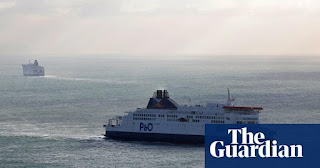Police on Ferries - Whatever Next?
This image accompanied the Guardian's reporting of this story and its source is here acknowledged
Police on ferries?
Whatever next? The announcement
this week that the government wishes to use the Civil Nuclear Constabulary
(CNC) to conduct armed patrols on cross channel ferries is an interesting one. On a simple level it is an attempt to close a
gap in our counter terrorism defences.
The absence of any police presence on ferries is an obvious issue when
other means of entering and leaving the UK have more comprehensive security and
policing regimes in place.
The government press release refers only to cross channel
ferries and the route to the Netherlands from Newcastle. This is slightly odd as it means that gaps
will continue on other routes.
Why will all the patrols be armed? Is this a result of a particular risk
assessment (presumably around marauding
attacks) or is it the product of the fact that the CNC will be the force
deployed and all CNC officers are armed?
Transport has nothing to do with civil nuclear material. The CNC do not currently have jurisdiction to
operate in this arena except at the request of local forces (or British
Transport Police for the railways). The
explanation is quite simple. CNC have
spare capacity. The closure of nuclear
power stations and the delay until their replacements come on stream mean the
force is available. There are no secrets
around this. The force and the
government have been quite open about the matter, even running a public consultation
on expanding the role of the CNC. The
consultation did not provoke a lot of public interest but it was available for
all to see. CNC have developed into a
modern and effective force. But they are
a force that does not routinely engage with the public. They exist as a protective body of well
trained constables with a precise mission.
They are free from any investigative functions and they are complainant
with the requirements of the College of Policing. But should we be content with this most
blatant example of mission creep? CNC
has assisted other forces in the past but those deployments occurred during
period of national emergency, now they are to be a regular feature of peacetime
travel.
Many ferries used to be subject of regular policing by the
British Transport Police (BTP). This
ended when Sealink, formerly part of British Rail, was privatised. It was a useful contingency in the days when
football fans travelled to Europe by ferry.
This work led to BTP senior officers giving evidence into causes of the
Heysel Stadium Disaster (1985) and to
that force leading the last large scale prosecution for the common law offence
of ‘Affray on the High Seas’ (1987). BTP
has experience of patrolling places crowded with passengers and has the option
of using both armed and unarmed officers.
In many ways it would be logical for BTP to return to ‘ferry policing’,
but this too would require amendments to legislation. The government home of BTP is the Department
for Transport (Dft – although always referred to by a least one magazine as ‘Daft’)
whilst it is the department of Business,
Energy and Industrial Strategy (BEIS) that has oversight of CNC.
Transport between France and the UK is policed in several
different ways. The fixed link and the
shuttle is the responsibility of Kent Police.
The Eurostar and Freight rail services are looked after by BTP. The Port of Dover has its own force. We can now add CNC into this mix which also
includes Border Force etc.
The CNC is made up of capable officers. There is no reason why they cannot make a
success of this endeavour. But is it another symptom of an increasingly fragmented
approach to policing, especially as it touches Non Home Department forces? The
legislation is a mess. Suggestions
around creating an ‘infrastructure’ police force, along the lines of the Indian
Central Industrial Security Force, foundered a couple of years ago – for good
reasons. Sellafield has little in common
with, say, Euston. Suggested machinery
of government changes that would have placed ALL policing under the responsibility
of the Home Office also failed to progress in 2014/15. Perhaps it is time to have a good look at
those police forces that sit outside the Home Office and to update the
legislation that enables or restricts them. Together they amount to several
thousand officers and make a significant contribution to UK policing.
We should welcome better security for international ferries
but it is right to question the logic that puts this in the hands of a police
force that was created, and is maintained, for other purposes, their
professionalism notwithstanding.
Feb 2022
This blog originally appeared on: https://www.blogger.com/blog/posts/6192421530041080418?hl=en-GB
This contents of this blog reflect the views of the
author and are not necessarily the view of Scott Trendall Ltd of any clients
thereof.


Comments
Post a Comment